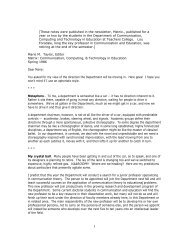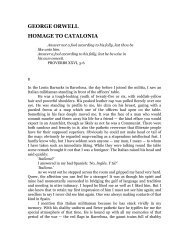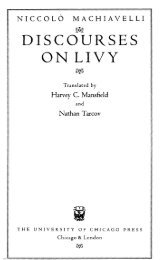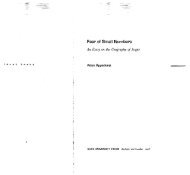THE REPUBLIC OF PLATO - Studyplace
THE REPUBLIC OF PLATO - Studyplace
THE REPUBLIC OF PLATO - Studyplace
You also want an ePaper? Increase the reach of your titles
YUMPU automatically turns print PDFs into web optimized ePapers that Google loves.
INTRODUCTION<br />
xvii<br />
to extremes of violence and treachery. At Athens the revolutions<br />
which occurred during the war were comparatively peaceful. Some<br />
of Plato's relations on his mother's side were active in the oligarchic<br />
reaction against the misconduct of the war by the democratic<br />
leaders. A letter written near the end of his long life recalls<br />
his state of mind when his friends were trying to enlist a recruit<br />
whose gifts of character and intellect were so remarkable.<br />
'When I was young, I had the same experience that comes to so<br />
many: I thought that, as soon as I should be my own master, I should<br />
enter public life. This intention was favoured by certain circumstances<br />
in the political situation at Athens. The existing constitution was generally<br />
condemned, and a revolution took place. 1 ••• Some of the leaders<br />
were relatives and friends of mine, and they at once invited me to<br />
co-operate, as if this were the natural course for me to take. No wonder<br />
that, young as I was, I imagined they would bring the state under<br />
their management from an iniquitous to a right way of life. Accordingly<br />
I watched closely to see what they would do. It was not long before<br />
I saw these men make the former constitution seem like a paradise.<br />
In particular they tried to send Socrates, my friend, then advanced<br />
in years-a man whom I should not hesitate to call the most righteous<br />
man then living-with other persons, to arrest one of the citizens by<br />
violence for execution. 2 Their purpose, no doubt, was to implicate<br />
Socrates, with or without his will, in their proceedings. He refused,<br />
preferring to face any danger rather than be a party to their infamous<br />
deeds. Seeing all this and other things as bad, I was disgusted and drew<br />
back from the evils of the time.<br />
'Not long afterwards the Thirty fell and the whole constitution was<br />
changed! Once more I was attracted, though less eagerly, towards taking<br />
an active part in politics. In these unquiet times much was still gt>ing<br />
on that might move one to disgust, and it was no wonder that,<br />
during the revolutionary changes, some took savage vengeance upon<br />
1 The oligarchic reyolution of 404 B.C. when Plato was 23, too young to hold<br />
office under C1eisthenes' law. A body known as the Tbirty seized supreme power.<br />
Among the leaders were Plato's uncle Charmides and his cousin Critias.<br />
2 Plato's Apology 32 C giyes a fuller account of this attempt to make Socrates aD<br />
accomplice in the arrest of Leon of Salamis.<br />
a The Thirty, after about a year and a half of power, were superseded by the<br />
exiled democrats in 403 B.C. A prominent man in the restored democracy was<br />
Anytus, the chief accuser of Sacrates on the charge of 'not belieying in the gods of<br />
Athena and demoralizing the young men. Socrates was executed in 399.









